2007 West of England Championship - Championship Section retrospective
15-Mar-2007There were two basics facts to be learnt about the Championship Section contest in Torquay on the weekend.
The first was that if the PolySteel Band can reproduce the form they showed here at either the Grand Shield (then hopefully the British Open) and the Royal Albert Hall later this year, then they will be very serous contenders to take home with them some major silverware. The second is that is hard to remember a contest where the difference in standard between the bands that came in the top six places and the five who did not, was so vast. This really was like listening to two contests in one.
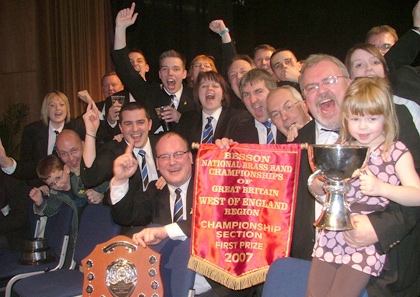
Champions: PolySteel celebrate their title win
The winners should be rightly delighted by their win. PolySteel delivered a performance of the highest class to take the title. The curse of the reigning champion may remain intact for a 12th consecutive year, but PolySteel won't start worrying about becoming its 13th victim in 2008 if they can continue to perform like this.
Philip Harper and his band can literally blow hot or cold on the contest stage at times, but when they do hit top temperature then it is scoldingly good. They were piping hot here.
Playing off the number 3 draw, the MD set out a fairly neutral musical interpretation that intelligently allowed the time and space for his fine stable of soloists to shine. And shine they did.
The pick was undoubtedly Vicki Reynolds on horn, who delivered her solo contribution with an air of musical maturity that belied her tender years, whilst Chris Lewis on repiano was an admirable locum for Principal Cornet Chris Howley in the demanding cornet solo. He only returned to the band in the week leading up to the contest following a painful operation and whilst he was able to give his usual 100% to the cause, the decision to use the talents of his repiano counterpart was fully justified.
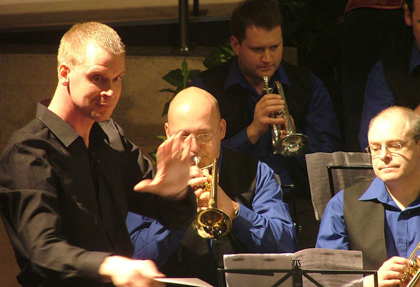
The eyes have it! Philip Harper keeps his eyes on the prize
Other notable contributions also came from the euphonium, baritone and flugel, and whilst there were moments of discomfort in some ensemble and solo parts, overall it was a performance of rich promise. The final ‘Eagle' inspired climax and run for home revealed a band very much on the top of its form and an MD (with score) who had everything under the tightest control. If they can now use this as the benchmark for all future contest performances, then look out.
With such a performance of merit to savour it is pertinent to add that the two bands that preceded it delivered accounts of ‘Isaiah 40' that in anyone's book were not of Championship standard.
Lydbrook and St Austell were awful - although on the day they were not alone.
Lacking the experience to overcome nerves is one thing; lacking the ability to overcome the very basics required to play at this level is something else. If you cannot play in tune, or together, lack the ability to grade dynamics and tempi, cannot meet the technical or musical challenges of a difficult, but not overtly daunting test piece, then you do have to question why on earth they are competing in the championship section.
Bands are graded according to their record of achievement here of course, but it should never disguise the fact that promoting a band for the sake of it is a recipe for disaster - and Lydbrook were disastrous.
Supporters and players alike may feel we are being unjust with the criticism (and may suggest who are we to say it), but someone has to, because we are sure Lydbrook were not alone here in Torquay, or around the country in not being able to play the piece to championship standard. The movement cannot afford to equate quantity to quality anymore and out of the 11 bands here on the Sunday only six met the demands of the piece. Heaven help if the Music Panel had picked ‘St. Magnus'.
Lydbrook could not play the piece and as admirable as their efforts may have been, their performance had little in it to commend. It had the odd moment, but that was all and it must have been a chastening experience to work so hard for so little musical reward.
Robert Morgan, Chairman of the BFBB, who played on the solo cornet bench must surely realise that the time has come for his organisation to press for a National re-grading of bands – and the plethora of withdrawals around the country at this level is no one off coincidence either – the two are linked.
St Austell was marginally better. We have heard them so much better than this in the past couple of years, but on this specific evidence they have regressed alarmingly since representing the region at the Nationals in 2005.
Nerves played a part, but there were so many unforced errors, lack of control of dynamics and tempi by the players, serious deficiencies in technique and general inability to meet the demands of the music that David Loukes was beating out the musical bush fires before the piece had even gone 20 bars. By its end it came as a relief that they had managed to get through.
After PolySteel came two performances that did manage to meet the technical and musical demands of the test piece – although both Aldbourne and Bournemouth produced accounts that could only be described as average at best.
Aldbourne got off to a decent start and with Kevin Robbins rolling back the years on principal cornet it sounded as if it had the potential to develop into something of stature. That it never quite managed to do that was perhaps an indication that the band was playing to the very limit of its ability and by the time a rather tired and harsh climax rounded things off it had long become an average championship performance.
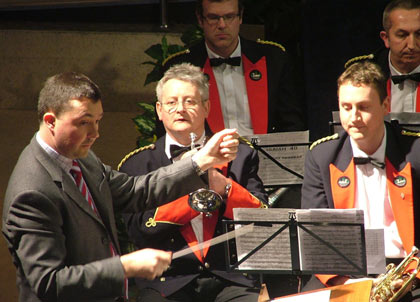
Robbin Island: Kevin Robbins gets ready to do his stuff with Aldbourne
The same could also be said of Bournemouth who started very well but soon fell into the trap of equating speed as vibrant excitement from the first Presto onwards. The composer himself had clearly stated in Bradford that he felt that excess speed killed the musicality of his piece, and that is what happened here. With such a dead acoustic the lack of clarity and precision in the ensemble was self evident, especially in the Caribbean section and the final run for home after the eagle inspired climax. Too often it was a mess and the lack of warmth at the top end of the dynamic range robbed the piece of heart felt passion.
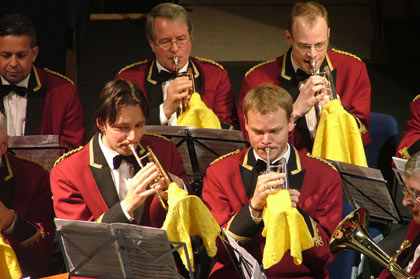
Dusting it off: Bournemouth put a bit of shine on in coming in 6th place
Mount Charles arrived as reigning champion and under the direction of Andrew Duncan produced a brave, if slightly edgy defence of their title that had much to commend in terms of approach both by the MD and his players.
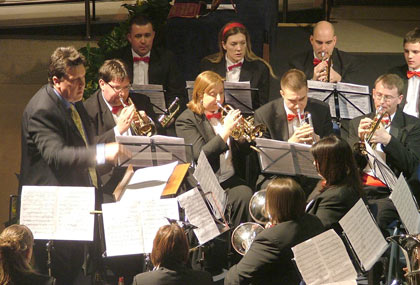
Taking the strain: Mount Charles make it to London again
They really did strain every musical sinew as they strove in the cause to make the most of the Scotsman's interpretataion of the score. At times it was a bit OTT and the main solo lines didn't quite have the sense of composure of the eventual winners (with the marked exception of an outstanding baritone), but they maintained their form and commitment right to the very last note. The final climax saw the eagle flapping a touch hard and fast, but with genuine excitement in what was a fine reading by the MD. They will be delighted that they have secured their place at the Royal Albert Hall once again, even if they couldn't quite hold onto their regional crown.
It seemed that the contest was now really warming up, but Yeovil Town couldn't match the standard set by the band they followed onto the stage and became another that delivered a performance that was not of championship standard.
There may be many reasons for this we don't know about, but the evidence on the stage was of a band that failed to meet the demands of the piece from the opening baritone statement to the final high speed technical flourish. Why there was a need for the solo cornet player to stand in his demanding solo was rather beyond us, especially when all the problems both here and especially in the horn solo were to be heard in the ensemble.
Too often Yeovil sounded a band of individuals rather than of coherent sections, and despite the hard work of the MD it never rose to meet the challenges the transparent music posed. It was very poor.
Back to the contest proper and Camborne and SWT Woodfalls, with Frank Renton and Nicholas Childs delivering lyrical accounts that perhaps their bands couldn't quite do full justice to.
Camborne were the better of the two for us, but not for the men in the box, and we felt that they may have even pipped PolySteel if they were persuaded by Frank Renton's broad and sympathetically moulded interpretation of the Redhead score.
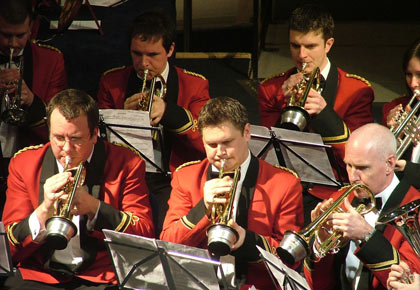
All in the right direction: Camborne's cornet section try their best to impress the judges
It wasn't to be, even though it was for many the one performance that caught the passion and lyricism that so fills the work. The final climax was superbly structured with an excellent measured accelerando and eagle inspired climax that really did capture the feeling of that glorious winged messenger swooping above the earths great oceans. However, the soloists were not as composed as those of the winners (although the euphonium playing was outstanding) and the first Presto was scrappy, but it was a high class performance nonetheless and they can count themselves a little unlucky that they missed out on a place at the Royal Albert Hall.
Much was anticipated of SWT Woodfalls under Black Dyke's Nicholas Childs, who delivered a lyrically musical performance that so nearly successfully camouflaged the obvious technical shortcomings in the ensemble delivery.
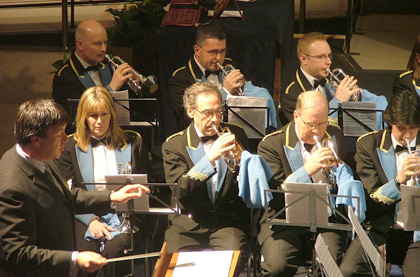
Band colours: SWT Woodfall try to mask any potential qualification problems.
There were more dusters on display (in band colours) than could be seen in a Mr Sheen convention, and although it did give a sense of dynamic variance it was rather too obvious a camouflage act the more it was used. So too was the euphonium playing the opening baritone statement (although to be fair the band took to the stage with only one baritone) and the need for practice mutes to be used to allow the main solo lines to come through in places.
The MD used every bit of his experience to make the most of his resources, and although his players tried manfully (and womanly in the case of the fine solo cornet and horn) it never quite came off despite a well delivered final third of the piece.
That was it really in terms of the contest itself, although there was Sherborne and Poole Borough left to play. Both unfortunately were not up to meeting the demands of the piece, although both approached it in a different musical manner.
Sherborne went for speed and volume – two virtues fine in themselves, but not on this piece when delivered without control and appreciation. A decent start held promise, but that soon dissipated with the emphasis on trying to mask the technical shortcomings by playing everything loud and fast.
When things did slow down you wondered what on earth the MD was thinking of by asking the rep player to walk to the back of the stage to play 1 bar as an echo of the solo cornet in the difficult the trumpet calls, whilst the lack of warmth in tone and lyricism in the main slow solos grated. A breakneck ending that seemed to be taken at such a speed as to obliterate any clarity reaching the box was also sub championship standard and rounded off a poor show.
Finally Poole Borough and a musical approach by the MD that was admirable in intent even if the actual execution wasn't up to the championship grade. Phil Randell delivered a very neutral reading of the score that allowed his players the time (nothing was done at a speed the players couldn't manage) and space to encourage them to try and allow the music to come to the fore.
That they couldn't manage it perhaps showed that they were a First Section band slightly out of their depth, but the MD must be congratulated for his intelligent approach even if the final execution wasn't in the same league.
That was that then and a contest of highs and real lows. We just opted for Camborne by the narrowest of margins ahead of PolySteel, but in the end you couldn't argue with the judges, David Hirst and Barry Thompson opting for Philip Harper's band gaining the regional title for the first time since 2000. This was high class playing of security of purpose and confidence of approach.
Mount Charles was right up there for us and SWT Woodfalls also deserved their high placing too. Aldbourne and Bournemouth got what they deserved but never really had it about themselves to press any higher, whilst the rest were degrees of mediocrity. There were some performances that when they came to the final eagle inspired climax sounded more like a flying frozen chicken from the local Iceland store – and just as cold and hard.
Poole Borough was unlucky to come last, but it was hard to find much to separate the rest.
Harsh? Yes. Fair? That's for other people to worry about. The West of England proved that there is a need for re -grading to be done and done quickly, not just here, but in every region of the country too. PolySteel though will only have eyes on making the grade at the majors later this year. And we don't think we are wrong in that.
Iwan Fox.















